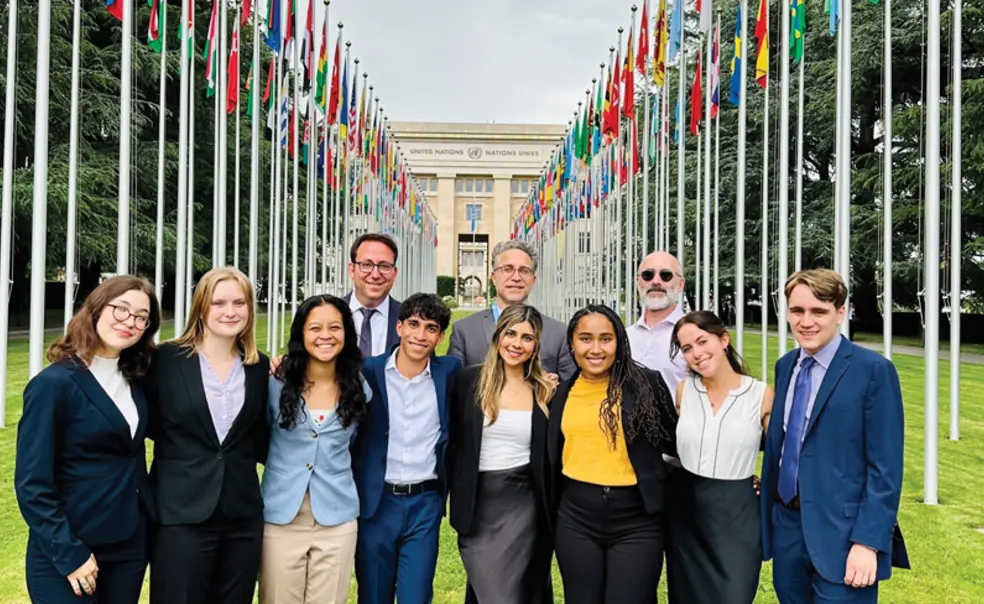SPIA Undergraduates Headed to UN in Geneva to Advocate for Change
For the third straight year, students in the School of Public and International Affairs are headed to Geneva, Switzerland, in late June to present original research and recommendations to the United Nations, developed in the school’s year-long Policy Advocacy Clinic (PAC) course.
Modeled after law school clinics, PAC is an alternative to the policy task force requirement for juniors majoring in public and international affairs. In the three years since the course launched, students have also developed bipartisan policy recommendations for partners such as the American Civil Liberties Union and members of Congress.
Though the fall semester is essentially a typical course — students study policymaking in a traditional classroom format — work is geared toward projects that students will dive into the following semester in small groups.
The goal is “not to simply engage in academic exercise” but rather to “support an ongoing advocacy campaign that will have real-world impact,” said Udi Ofer, PAC founder and director. Ofer is a Weinberg Visiting Professor and lecturer of public and international affairs, as well as a former longtime attorney for the ACLU.
According to Ofer, “The clinic has developed a reputation now. People have heard of it. I get lobbied by outside organizations saying, ‘Hey, will your students work on this?’”
This year, two projects focused on criminal justice and two were technology-based; Mihir Kshirsagar, clinic lead for the Center for Information Technology Policy, helped advise the tech groups.
Ofer makes clear from the application process that an above average workload will be expected, but demand is so strong that the cohort has expanded from nine to 16 students.
Sophie Glaser ’26 wasn’t scared away. “For all the work and all the tough times, I think it’s an experience you’re really not going to get elsewhere,” she said.
Glaser said PAC felt meaningful even during the fall. “I’m not taking notes just because I’m going to have some tests coming up; I’m taking notes because these are actual skills that I’m going to need when I’m working on my project in the spring,” she said.
During the spring, the class seldom met as a whole — groups mostly worked independently.
At the end of the semester, each group gave an in-class presentation and submitted a final paper. Glaser and her three groupmates produced a 268-page report on the U.S.’s compliance with the U.N. Convention Against Torture. The work continued after exams as they refined handouts, practiced their presentation, and kept abreast of related news in preparation for their meeting with the U.N. Office of the High Commissioner and the U.N. Human Rights Council this summer.
Aishwarya Swamidurai ’26, a member of Glaser’s group, said she felt the final presentations “sort of acted as a midpoint,” but said hearing “about our classmates’ work and what they’ve been up to made me really proud to be a part of the class.”
A second group traveling to Geneva will present to the U.N. Refugees Agency recommendations on how the U.N. High Commissioner for Refugees can safely utilize artificial intelligence.
Of last year’s Geneva trip, Jennifer Melo ’25, part of the 2023-24 cohort, said, “The rooms we were in, the places, the people — it was such a privilege and an honor.”
Bita Jalalian ’25, who presented in Geneva last summer after working with the ACLU, said one highlight of the course “was just how much power [the ACLU] gave us as the students. It was really like we were in the drivers’ seats, and they were just there to guide us and support us.”
This year’s other PAC groups focused on state and domestic policy. One group produced a 581-page research memo on Republican-led criminal justice reform efforts over the past 25 years in the Southern U.S. and presented at the Louisiana State Capitol to the House Republican Caucus and the Louisiana Legislative Black Caucus. Another presented recommendations on online age verification methods to the New York Attorney General.












1 Response
Shelli Dorf
8 Months AgoSPIA Trip to Geneva
We are so proud of you, Sophie.